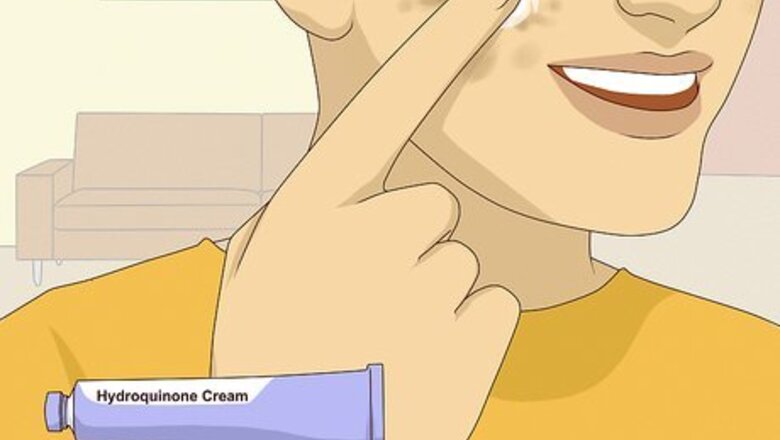
views
Hyperpigmentation and Melasma
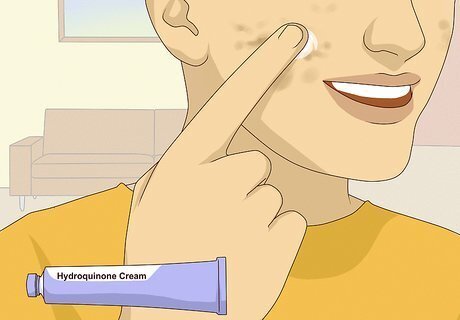
Apply topical hydroquinone to help lighten your dark spots. Hydroquinone is a skin-lightening treatment commonly used for hyperpigmentation and melasma. You can find it as a cream, lotion, gel, or liquid, some of which you can get over-the-counter without a prescription. However, your doctor can also prescribe you a stronger product that can help treat your dark spots. Apply the treatment directly to the dark spots on your face according to the directions on the packaging. A few popular OTC products include Differin Dark Spot Correcting Serum and Ambi Skincare Fade Cream.
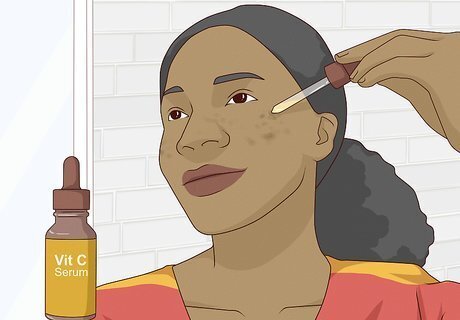
Use topical vitamin C as a natural alternative. Vitamin C is a natural antioxidant that can help block free radicals and improve your skin health in general. But, it’s also been shown to stop the processes that produce melanin in your skin, so it can help reduce dark spots and patches. Apply a vitamin C serum or cream directly to the problem areas to treat the spots and help them fade naturally. Look for topical vitamin C products that are designed to be applied to your skin. You can find them at your local pharmacy or supplement store.
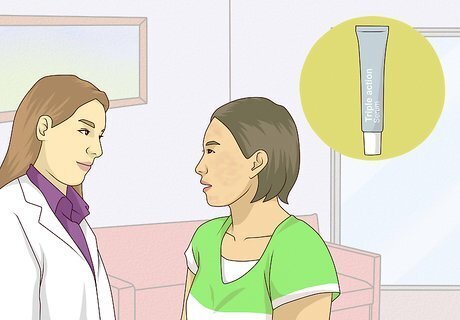
Ask your doctor for a triple cream to enhance your skin lightening. If your dark spots are especially pronounced or stubborn, talk to your doctor about prescribing a cream that contains hydroquinone, tretinoin, and a corticosteroid, known as a triple cream. Apply the cream directly to the dark spots, following the directions on the packaging to help them fade away more quickly. Triple creams work for both sun spots and melasma caused by pregnancy. Triple creams can be irritating to sensitive skin and usually take 3-6 months to significantly reduce your dark spots.

See a dermatologist to get a chemical peel for spots that won’t fade. A chemical peel uses a chemical solution to remove the top layers of skin, which could help remove or fade your dark spots. If your dark spots are super stubborn make an appointment with a dermatologist to get a chemical peel or ask your doctor for a referral to one. Never try to do a chemical peel yourself. Only a licensed dermatologist can safely perform one.
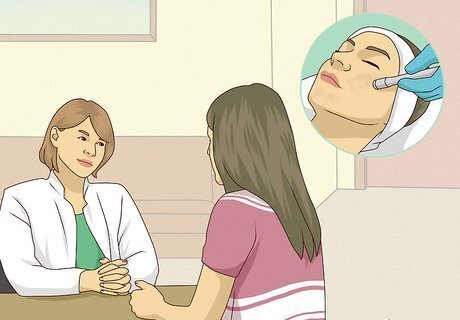
Talk to your doctor about microdermabrasion. Microdermabrasion uses an abrasive instrument to gently sand your skin and remove the outer layer, which can fade the dark spots on your face. If your spots are deeply ingrained, microdermabrasion can help them fade more quickly. Ask your doctor if it’s safe for you and make an appointment with a dermatologist who can perform the procedure. A dermatologist can safely and hygienically perform microdermabrasion treatments.
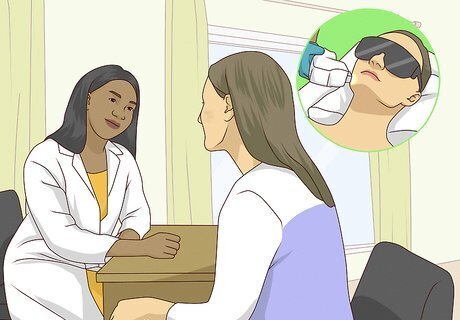
Ask your doctor about laser or light-based treatments. Laser and light treatments use specialized equipment to remove pigment without scarring, but you’ll usually need a test spot to make sure your skin doesn’t react negatively to it. Talk to your doctor about getting laser treatments that can help fade your spots more quickly. Only a dermatologist should perform any of these procedures.
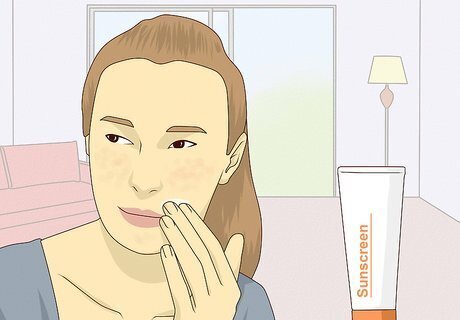
Wear sunscreen to help prevent dark spots from getting worse. Daily sunscreen may be the best way to prevent hyperpigmentation. Even low levels of UV light can add up and lead to dark spots. Look for physical sunblocks, meaning sunscreens that contain either zinc oxide or titanium dioxide, which can block out most of the rays that can darken your skin. Dark spots caused by melasma can become darker if they’re exposed to the sun as well.
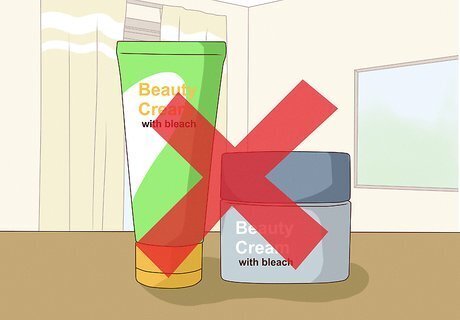
Avoid products with bleach or other harmful chemicals. Never use products that contain bleach or you could seriously damage your skin. To be extra safe, buy skin-lightening products made in the US or one recommended by your dermatologist so you can confirm the ingredients. Steer clear of questionable treatments, such as lemon juice, which may actually do more harm than good.
Acne and Facial Scars
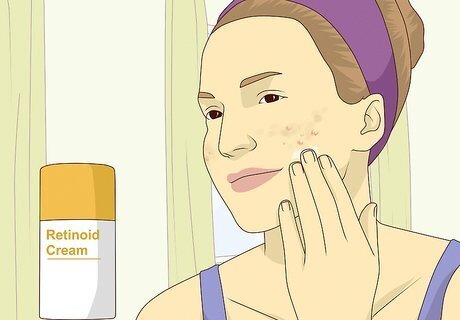
Apply a retinoid cream to treat your acne and dark spots. Retinol can unclog pores and help fade dark spots, meaning it can both treat your acne and help your dark spots fade. Look for a retinoid cream at your local pharmacy or order some online. Apply a thin layer of the cream directly to any pimples or dark spots to help them fade more quickly and even out your skin tone. Popular retinoid products include Shani Darden Skin Care Retinol Reform, Olay Regenerist Retinol 24 Night Facial Moisturizer, and PCA Skin Intensive Brightening Treatment.
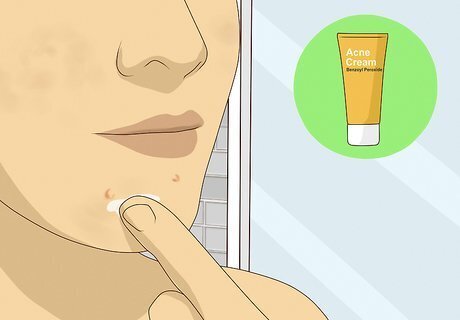
Treat acne early to help prevent and reduce dark spots. Studies show that treating acne early can help keep it from getting worse. Wash your face at least twice a day and apply a salicylic acid toner to help treat your skin and fight the acne. You could also spot treat the acne with a benzoyl peroxide gel to help it clear up faster. It’s easy to get focused on getting rid of your dark spots, but it’s also important that you treat the acne that’s causing them, too.
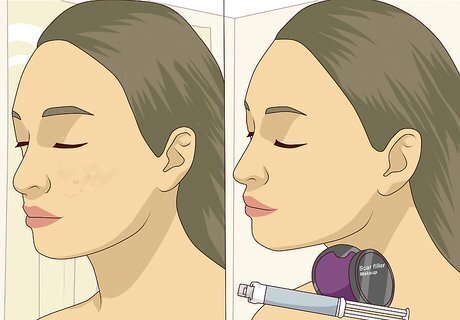
Use a scar filler to temporarily cover acne scars. Scar fillers are temporary dermal fillers, meaning they fill gaps and spaces in your skin. If you’re looking for a quick way to get rid of dark spots on your face, try applying a thin layer of scar filler over the marks like you would makeup so it fills in and evens out your skin. It’ll wash off easily whenever you’re ready to remove it. Look for scar fillers at your local pharmacy or the makeup counter of a department store. You can also order them online.
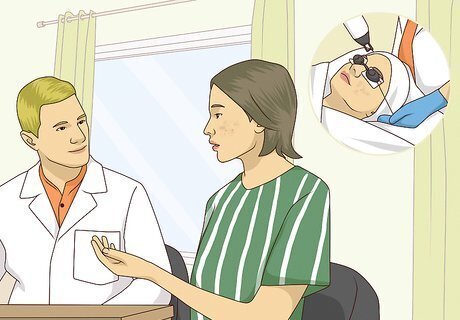
Talk your doctor about laser treatments for serious acne scars. If you can’t get the dark spots caused by acne on your face to fade with other products, your doctor may be able to use a laser to help improve them. Make and appointment with your dermatologist if you’re interested in trying out laser treatments. Keep in mind that insurance may not cover the cost of cosmetic treatments like laser treatments. Laser treatments can cost between $900-$1,600 USD.
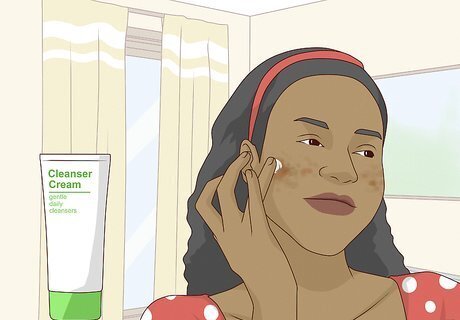
Try switching to a gentler skincare product if your skin is irritated. Super strong acne or psoriasis products can damage or irritate your skin. That can cause your skin cells to overproduce melanin as a response. Look for products labeled “sensitive” or “gentle” instead of using stronger products that may be irritating your skin and potentially causing dark spots. Wash your face every day, especially before you go to bed at night. Look for gentle daily cleansers that are designed for delicate skin such as Cetaphil Gentle Skin Cleanser, CeraVe Hydrating Cleanser, and Ghost Democracy Transparent Gentle Exfoliating Daily Cleanser.
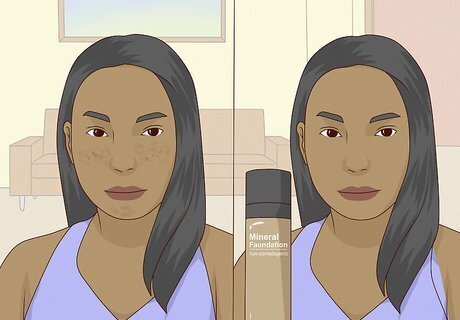
Avoid using heavy, oily makeups to cover dark spots. Makeup may seem like a simple way to hide dark spots, but they can actually make the problem worse. If you do choose to wear makeup, go with mineral makeup that labeled as non-comedogenic, which can cover up dark spots without making them worse. Look for non-comedogenic makeup at your local pharmacy or department store. You can also order it online.


















Comments
0 comment